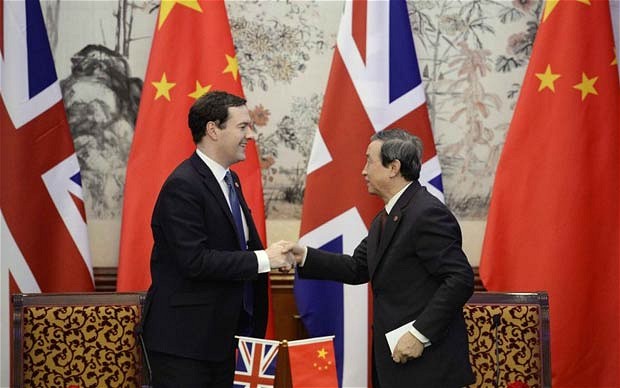

 By VennerRoad, 5th Dec 2014
By VennerRoad, 5th Dec 2014
Chancellor George Osborne took a swipe at Google in his recent Autumn Statement. Does he understand what he is talking about?

George Osborne in China last year.
In his Autumn Statement, Chancellor George Osborne said “..we will make sure that big multinational businesses pay their fair share.
Some of the largest companies in the world, including those in the tech sector, use elaborate structures to avoid paying taxes.
Today I am introducing a 25% tax on profits generated by multinationals from economic activity here in the UK which they then artificially shift out of the country.”
Although he didn’t name these tech sector companies, one of those to which he was referring is Google, indeed, this proposed new tax has even been called the Google Tax. He didn’t go as far as Margaret Hodge – who claimed Google is “evil” – but it is clear that he regards this company as what has been called the unacceptable face of capitalism. But is it?
Google was founded in only 1998 when the Internet was in its infancy. The brains behind it were and are American Larry Page and the Russian-born naturalised American Sergei Brin. Although its HQ is based in California, Google operates worldwide. In 2004 it was floated on the stock market, but its main men retain control. Currently it has over 70 offices in more than 40 countries including four in the UK, three of those in the capital. If Google is a young company, so are its staff. It pays and treats them extremely well, including its small UK force.
Like all big companies, Google has faced criticism from various quarters over technical issues, and such things as copyright. Some of these are unavoidable. Although it began life as a humble search engine, it has now expanded far beyond that with its own browser, e-mail and cloud storage, comprehensive road atlases and maps, translator, and much, much more, including YouTube.
A company that gathers and uses information on such a massive scale cannot please everybody all the time, and indeed at times Google has been attacked by privacy watchdogs for gathering and sharing too much, while at other times it has been attacked by apparatchiks for refusing to spy on its users. Some have even gone so far as to claim it gives aid and comfort to terrorists, with the implication that Big Brother should have the right to read all our e-mails without warrant, as well as listen in to our phone calls and presumably to spy on us in our own homes to ensure we aren’t saying anything someone somewhere might find offensive.
None of this appears to concern the Chancellor though, what does concern him is that Google – and other multinational companies – are not paying their “fair share” of tax. What he doesn’t seem to realise is that all the services enumerated above are supplied to UK citizens as to citizens of all other countries totally free. Google does offer some premium services, but the man on the Clapham omnibus, the housewife, the student, the pensioner, get all these goodies absolutely free. All is needed is an Internet connection, and you don’t even need that if your desires are modest and you are content to log on at your local library two or three times a week.
If you were providing all the above services totally free, would you not consider it a novel idea or even a liberty to be asked in addition to that to pay for the privilege of doing so? Let’s put this another way, is Google a drain on the UK economy, or does it contribute to it? The way to answer that question would be for Google – and all the other Internet companies – to boycott the UK for a month, or perhaps offer their services on a subscription only basis. What would that do for the economy? Does George Osborne really believe Google is the unacceptable face of capitalism when he shares a spreadsheet using Google Docs, or when he watches one of his old speeches on YouTube?
So if Google is not the problem, what is? In his speech, Mr Osborne pointed out that the annual interest on the UK national debt was £16 billion lower than previously, which begs the question why is there any interest at all? The perceived wisdom is that the Government has to borrow money, and to balance its budget. The reality is that this money comes primarily from the banking system. Unlike Wonga, it does not even lend real money, rather it conjures it up out of thin air and sells it to the Government at interest. Why should the Government borrow something that it can create for free?
The British Government and indeed all governments could create their own credit for public works and spending; provided this is done responsibly, it will not cause inflation (the usual mantra). For the UK to do that would require withdrawal from or augmentation of the Treaty of Maastricht, which in effect makes us slaves to the European Central Bank. In the US, that power is wielded by the Federal Reserve.
If the Chancellor wants to raise funds to run the country, the way to do that is to sort out the corrupt debt-based money system rather than penalise or even demonise Google and like-minded idealistic corporations that benefit this country and the entire world, and without whom all our lives would be so much poorer.
To Wikinut Articles Page